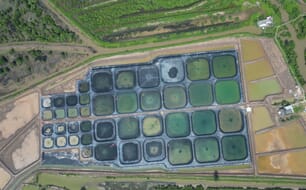"This is a big day for Marine Harvest and the salmon farming industry," said Alf-Helge Aarskog, CEO of Marine Harvest. Together with Chairman Ole Eirik Lerøy he had the honor of ringing the opening bell at the NYSE today.
Marine Harvest, the world's leading seafood company, is the first aquaculture company to be listed at the NYSE. The company controls about 22 per cent of the global production of farmed Atlantic salmon, the most industrialised and commercially developed aquaculture specie.
"According to the UN, the world must increase its food production by 70 per cent by 2050. As much as 70 percent of the globe is covered by water. Yet, only six percent of the world's protein supply is sourced from the oceans today. The potential is enormous," said Mr Aarskog.
Leading the blue revolution
Marine Harvest has chosen "Leading the blue revolution" as its vision. The company wants to be a leader in cultivating and growing food from the ocean.
"Our vision is to be "leading the blue revolution" - something similar to what happened 5,000 years ago with the agriculture revolution when people move from hunting and fishing to agriculture. We want to elevate aquaculture to be comparable to agriculture and beyond," Mr Aarskog added.
Number of advantages
Marine Harvest is the first vertically integrated aquaculture company to be listed on the New York Stock Exchange. Aarskog sees a number of advantages of being listed at the NYSE.
"The listing gives us exposure to a larger part of the US investment community, including those who are not mandated to invest in Norway. Marine Harvest should also benefit from being aligned to the land based protein companies listed in the US. These companies are generally larger than Marine Harvest, but we have some superior attributes in terms of margins and growth prospects which should be attractive to investors," said Mr Aarskog.
"This gives us access to a wider portion of the US investor base. It will also be beneficiary to have a currency that can be applied in future consolidation of the industry. We have a good starting point with a market cap of about $5 billion and ownership of about 22 per cent of the global production of farmed Atlantic salmon," Mr Aarskog added.



